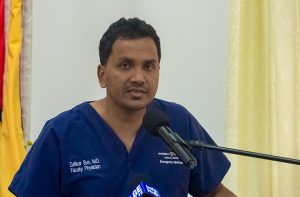– says Public Security Minister Khemraj Ramjattan
AS the local economy continues to expand, the increase in demand for emergency and other services necessary for public safety can only be met through collaborative efforts.
This was the aim of the Guyana Fire Service (GFS) Stakeholder Consultation Forum held on Thursday at the Arthur Chung Convention Centre, Liliendaal, an event applauded by the Minister of Public Security Khemraj Ramjattan.
“We have to ensure that we collaborate with the larger set of stakeholders and not deal with this thing in a compartmentalised way,” he opined.
“The MoPS sees the need for the transformation of all the units coming under it, the morphing of all those units into something better.”

The event was attended by various heads within the Joint Services, namely Fire Chief Marlon Gentle; Director of Prisons, Gladwyn Samuels, Commissioner of Police, Leslie James and Guyana Defence Force (GDF) Chief of Staff, Brigadier Patrick West.
National Emergency Service Director, Dr. Zulfikar Bux was also present and spoke of some of the accomplishments of the National Emergency Medical Services (EMS) over the two years since it was launched in November 2016.
Dr. Bux talked of the extensive work that the EMS has achieved over the few years working with only just three ambulances. He related that the system is aiming towards a full complement of 25 ambulances to see basic Emergency Medical Technician (EMT) services across the country; in addition there are hopes of bringing onboard an aviation division to take similar services to the hinterland communities.
There is also the aim of hoping to see all members within the GFS being trained in first responder skills, in order to save lives in emergency cases.
The EMS is a collaboration between the Ministry of Public Health (MoPH), and the Ministry of Public Security (MoPS), particularly through the involvement of the GFS.
The fire chief noted that the EMS is just one part of the GFS overall strategic plan to see proper emergency coverage for the country by 2021.
“It is hoped that the feedback from this consultation will strengthen us to move forward with this plan. So that by the year 2021, there is a modern fire service, that the goals and objectives that this fire service sets out in its strategic plan is met, and that we are on the road to having the right emergency cover, the right fire protection cover and the right fire prevention methodology needed to protect us,” Gentle said.
MUCH WORK NEEDED
Despite the improvements that have been made over the past few years, the country’s need for proper emergency services still requires much work.
The imminent oil and gas industry, the expansion at the Cheddi Jagan International Airport, and the continued increase of housing schemes across the country, are just a few of the areas where Minister Ramjattan questioned the country’s current ability to deal with emergencies.

“As a country, we have started getting into circumstances vastly dissimilar to what we met in 2015. We must ask what are some of the new technical expert advice we must have. If the call is made that we have to meet certain fires in the oil and gas sector, are we ready? Are we up there for certain planes landing in difficulty? Ensuring minimum damage is done or no damage at all. All of these things we have to start planning for,” he said.
A point of concern for the minister was the sizes of streets within many new housing schemes and their abilities to accommodate a fire engine, or having sufficient water within the community for fire trucks to use once they get there.
This means that there is an ever increasing need for the various stakeholders to continue to strive towards meeting these needs. The development is something that must be continuous.
“We must innovate; we must creatively draw up the plans for a future that will meet our demand. A number of us feel that if a certain set of requirements that we foresaw two years ago is happening now that then we can stop thinking but no. To be human, to be an excellent worker means that you always have to be thinking, it’s a never-ending process and that’s what evolves us,” Ramjattan stated.
But the only way this can happen is through partnerships.
“We have to cultivate a culture of wanting to think the solution and one way of thinking the solution is having collaborative efforts through stakeholders,” Ramjattan explained.





.jpg)








